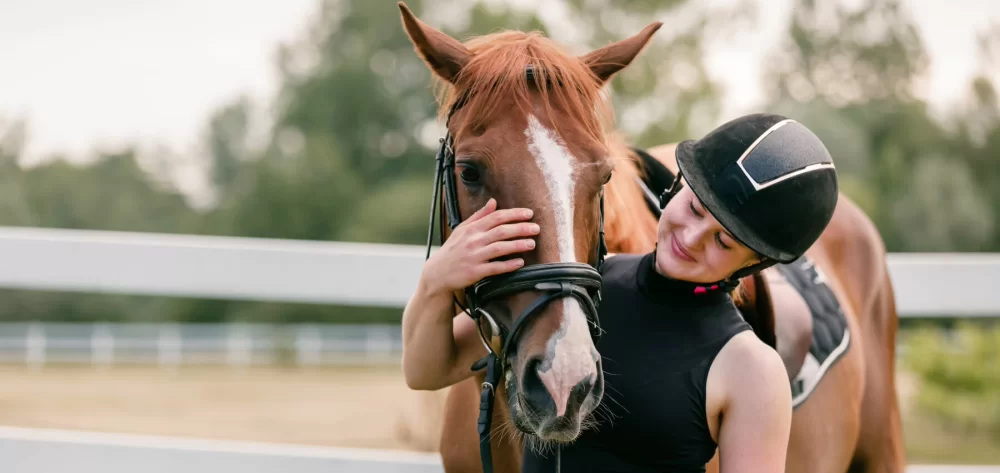Here, moneyland.ch explains the most important things to consider before you buy a horse in Switzerland.
1. Contemplate alternatives to keeping a horse
Owning a horse in Switzerland is expensive. Unless you have a very healthy bank balance, the high costs can end up dampening the joy of having your very own horse. Before you buy a horse of your own, consider these alternatives:
- Horse sharing: In this arrangement, you help a horse keeper or stable care for a horse. You commit to ride the horse on specific days of the week or month, and may also be expected to take turns grooming the horse and cleaning the stable. You pay the keeper a relatively-low fee – typically 100-300 francs per month – for the privilege of sharing the horse. Horse sharing is very much like keeping your own horse because you ride and care for just one horse on a regular basis, but with much less expense and commitment. You can find horse sharing offers on classifieds websites like Anibis, E horses, Horsedeal, Reitbeteiligungen.ch, Tier-Inserate, and Tutti.
- Volunteering: Animal shelters for horses can be found across Switzerland. Many of these happily accept volunteers who are willing to help care for their horses. The focus in this case is not on riding, but if you primarily just enjoy being around horses and helping to make their lives pleasant, then this option is worth looking into. Some commercial stables accept volunteers as well.
- Internships: If you have time on your hands (between jobs or studies, for example), doing an internship at a Swiss stable offers a way to enjoy being with horses, while improving your knowledge of equines. You may even earn a small salary instead of paying to buy and care for your own horse.
- Part-time jobs: If you have experience with horses, working at a stable part-time (one day per week, for example) is an ideal way to spend time with horses without the costs that come with owning them.
2. Create a budget
The strong emotional aspect of keeping a horse makes careful budgeting exceptionally important. If you are thinking about getting a horse, a good first step is to calculate how much money you can easily afford to allot towards this project. Only once you know exactly how much money you have to work with can you move on to looking at prices and getting quotes.
Your budget should account for both one-time costs (like buying and transporting a horse, and getting necessary tack), and ongoing costs like stable rental, feed, insurance, grooming, shoeing, and unexpected expenses. If your budget does not easily cover all possible expenses, then you should consider the alternatives to keeping your own horse.
3. Compare boarding prices at different stables
Unless you have your own stable, you will have to rent a stall elsewhere. The services provided vary between stables, as do the boarding fees. Websites like Pferde-Boxen.ch make it easy to find and compare offers. Many stables and farms also advertise stalls on the websites for classified ads mentioned further up.
The fees for monthly boarding with all basic services range between around 500 francs and well over 1400 francs, depending on the location and the facilities offered. Taking the time to compare the prices charged by different stables in your area and choosing a more affordable option can save you thousands of francs per year.
4. Think about which services you really need
As a general rule, the more services and amenities a stable provides, the higher the rent is likely to be. Having access to a riding hall, treadmills, and other amenities will not benefit you much if you only ever take your horse riding on trails. On the other hand, if you need special amenities and would otherwise have to rent them separately, then paying more for a stable which includes these amenities in its monthly fee may actually work out cheaper.
Many stables charge additional monthly fees for extras, such as more comfortable bedding, dietary supplements, and special grooming. Here too, you should consider which services your horse really needs, and add up the total annual cost to make sure you do not overspend your budget.
5. Compare horse insurance offers
Horses are prone to illnesses and accidents, so getting veterinary insurance can be beneficial in many cases. Apart from the countrywide pet insurance offers included in the pet insurance comparison on moneyland.ch, there are also numerous cantonal horse insurance schemes. Once you have settled on a horse, request insurance quotes from as many different insurers as possible and compare the offers to find the most affordable insurance.
In addition to the price, it is also worth considering which cover you need. Some horse insurance offers include life insurance and/or disability insurance which you can claim on if your horse is killed or disabled. You can learn more about horse insurance in the guide to Swiss veterinary insurance for horses.
6. Get the right personal liability insurance
The vast majority of Swiss personal liability insurance offers cover liability for injuries and damages to third parties caused by a horse which you own (on a private, non-commercial basis). But there are offers which do not include this coverage. Make sure your insurance covers third-party liability for horse keepers. Competitions are generally excluded from the basic horse coverage which comes with most personal liability insurance offers.
Many insurers cover injuries to non-commercial caretakers by your horse in their basic personal liability insurance. Having this insurance is very important if you will share your horse with other people, or if friends will help take care of it. Some offers, like those from CSS and Groupe Mutuel, do not cover injuries to voluntary caretakers by your horse. It is also worth looking at the coverage for injuries to voluntary caretakers to whom you entrust your horse (while you are away on holidays, for example), as many insurers do not cover this scenario.
If you plan to borrow or rent a horse, or to care for someone else’s horse, then make sure your personal liability insurance covers injuries to other people’s horses, and damages to borrowed tack. This coverage is typically offered as an optional rider which you can add to your basic insurance policy. Most insurance offers give you this option, but some do not. Some insurers – namely Mobiliar, Vaudoise, Visana, and Zurich – give you the option of adding coverage for competitions.
Important: Personal liability insurance covers your legal liability for damages or injuries to third parties by your horse, or for injuries to borrowed horses. If it is found that you were not at fault for an incident, then you will not be legally liable to pay for damages, so you cannot claim on your personal liability insurance.
Because of the somewhat unpredictable nature of horses, it is very possible for a borrowed or rented horse to injure itself without any fault on your part. In this case, the injured horse’s owner will have to claim on their horse insurance, if they have one.
7. Optimize your household insurance
If you own valuable riding tack, then having household insurance is beneficial. This insurance covers riding tack which belongs to you against burglary, fire, and some other hazards. Simple theft – stealing without breaking in – is covered when your tack is kept at home. If you store it elsewhere, it may be worth adding coverage for simple theft away from home. This is generally offered as an optional supplement for your household insurance.
Important: Pets like dogs and cats are insured by your household insurance along with your personal property. That is generally not the case with horses. If your horse is killed in a fire or other hazard covered by your household insurance, you will not be able to claim insurance benefits for the loss of the horse. You can use horse insurance to insure your horse or pony.
8. Understand applicable laws
In Switzerland, all horse keepers must adhere to federal laws governing the proper treatment of horses. You can find these here (in French, German, and Italian). But in addition to federal laws, special rules may apply in cantons, districts, and municipalities. For example, there are municipalities in which riders are required to clean up their horse’s excrement, and can be fined for not complying. Getting informed about the rules in all of the areas you are likely to ride in can help you avoid fines and other complications.
9. Save on tack and accessories
The temptation when you buy a horse is to spare no expense on kitting out both yourself and your horse. But by taking the time to look for sales and compare prices at different stores, you can often get the same items at a much lower cost.
Things like riding helmets and horse tack which are unsafe or unsanitary to reuse should be bought new. But other items – like turnout sheets and stable tools – can be bought second hand at a fraction of their new price. Even saddles and other essentials can be bought second-hand from horse tack dealers who can guarantee their quality and consult you in finding the correct fit. Reselling things you no longer need can help you recover some of your costs.
More on this topic:
Financial tips for hikers
Financial tips for amateur climbers
How to save on gym memberships

 Deal of the Day
Deal of the Day 




